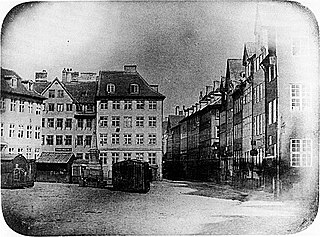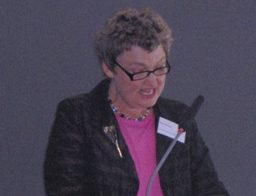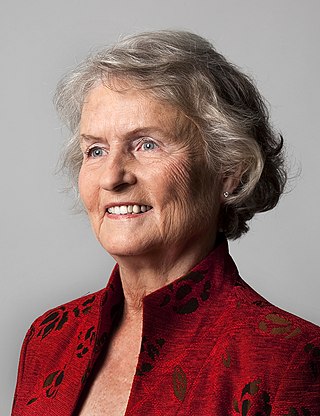
Ole Christensen Rømer was a Danish astronomer who, in 1676, made the first measurement of the speed of light and discovery that light travels at a finite speed. Rømer also invented the modern thermometer showing the temperature between two fixed points, namely the points at which water respectively boils and freezes.

Baron Herman Severin Løvenskiold was a Norwegian-born Danish composer, most noted for his score for August Bournonville's 1836 version of the ballet La Sylphide for the Royal Danish Ballet in Copenhagen.

Sophie of Mecklenburg-Güstrow was Queen of Denmark and Norway by marriage to Frederick II of Denmark. She was the mother of King Christian IV of Denmark and Anne of Denmark. She was Regent of Schleswig-Holstein from 1590 to 1594.

Folketing elections were held in Denmark on 6 May 1915. In order to make amendments to the constitution, the government called for the dissolution of both the Folketing and the Landsting to allow a new Rigsdag to make the revisions. However, as this was during World War I, no campaigning took place, and 105 of the 115 were uncontested.

Kai Normann Andersen was a Danish composer who wrote film scores and music for stage revues and dramas. He composed songs for over 50 films between 1930 and 1965. In the 1930s and 1940s he dominated Danish film music. He has been called "[o]ne of the most appealing personalities of our time in the light music field". Twelve of his songs have been included in the Danish Culture Canon. Connie Hedegaard and Claus Hagen Petersen list him among the 100 most important Danes of the 20th century.
The 1964 Danish 1st Division was the 37th season of Denmark's top-flight association football division since the establishment of Danmarksturneringen's nation-wide league structure in 1927, and the 51st edition of the overall Danish national football championship since its inception in 1912. Governed by the Danish FA, the season was launched on 26 March 1964 with a clash between last season's third-placed B 1903 and Østerbro-based and local rivals B.93 with the last round of six matches concluding on 15 November 1964. Esbjerg fB were the defending league champions, having won their third consecutive league title last season, while BK Frem and B.93 entered as promoted teams from the 1963 Danish 2nd Division. Fixtures for the 1964 season were announced by the Danish FA's tournament committee on 6 January 1964, featuring a nine weeks long summer break.

In Denmark, photography has developed from strong participation and interest in the very beginnings of the art in 1839 to the success of a considerable number of Danes in the world of photography today.

Margit Warburg is a Danish sociologist of religion. Since 2004, she has been professor of Sociology of Religion in the Department of Cross-Cultural and Regional Studies at the University of Copenhagen. She was an associate professor at the same university from 1979 to 2004.
A bibliography of books and material related to the Architecture of Denmark:

Lisbeth F.K. Holter Brudal is a Norwegian psychologist living in Oslo, Norway. She is particularly known for her pioneer work in the areas of birth psychology and communication.

Bi Skaarup was a Danish archeologist, author, food historian and lecturer. She was employed at Museum of Copenhagen from 1985 to 2006 as curator, and was responsible for parts of the excavations during the construction of Copenhagen Metro and wrote several articles about the subjects.
Morten Piil was a Danish writer and film critic. He received a Bodil Honorary Award in 2002 for his "long-standing contribution to Danish film literature".

Olga Sofia Ravn is a Danish poet and novelist. Her works have received international critical acclaim. She is also a translator and has worked as a literary critic for Politiken and several other Danish publications.
The Department of Psychology at the University of Oslo is the oldest and largest research institute and educational institution in psychology in Norway. It is Norway's main research institution in clinical psychology, cognitive psychology, developmental psychology, personality psychology, and social and cultural psychology, and one of the main research environments in neuroscience. The institute is located in the Harald Schjelderup Building adjacent to Oslo University Hospital, Rikshospitalet in the Gaustad area of Oslo; the building is shared with parts of the Faculty of Medicine, while Oslo University Hospital occupies surrounding buildings. The institute's alumni include two Nobel laureates, Edvard Moser and May-Britt Moser.

Anna Elisabeth "Lise" Østergaard was a Danish psychologist and a politician in the social-democratic party. Under Anker Jørgensen's leadership, she was Minister without Portfolio (1977–80) and Minister of Culture. As a psychologist, she was head of psychology in Copenhagen's Rigshospitalet (1958) as well as the first woman to become professor of clinical psychology at Copenhagen University (1963), a position she resumed after her political career ended in the mid-1980s.

Sara Omar is a Danish-Kurdish author, human rights activist and poet. She is the first internationally recognized female novelist from Kurdistan Region of Iraq. She started out as a poet and has published several critical articles in the Middle Eastern media.

The Chief of the Army Command is the service chief of the Royal Danish Army. The current chief is Major general Gunner Arpe Nielsen.
The Danish football league system, also known as the football league pyramid, refers to the hierarchically interconnected league structure for association football in Denmark, in which all divisions are bound together by the principle of promotion and relegation. Within men's association football, the top two professional levels contain one division each. Below this, the semi-professional and amateur levels have progressively more parallel divisions, which each cover progressively smaller geographic areas. The top four tiers are classed as nationwide, while the fifth tier and below are classed provincial leagues. Teams that finish at the top of their division at the end of each season can rise higher in the pyramid, while those that finish at the bottom find themselves sinking further down. In theory it is possible for even the lowest local amateur club to rise to the top of the system and become Danish football champions one day. The number of teams promoted and relegated between the divisions varies, and promotion to the upper levels of the pyramid is usually contingent on meeting additional criteria, especially concerning appropriate facilities and finances.

The Grosserer-Societetet was a society for wholesale merchants in Copenhagen founded by law in 1742. Since 1714, it was possible to acquire citizenship as a wholesaler in the city. Grosserer-Societetet was reorganized in 1817. In 1987 the association was replaced by the Danish Chamber of Commerce.













